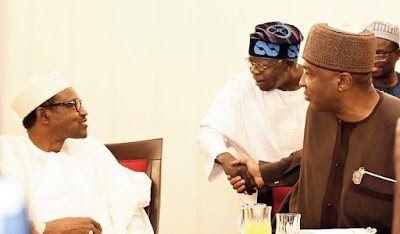By Joe Igbokwe
I was shocked to the marrows when I heard that some APC
Senators asked the National Working Committee of the Party led by the National
Chairman of the Party Chief Odigie Oyegun to prevail on President Buhari to
drop all charges against Bukola Saraki at the Code of Conduct corruption trial
before they stop sabotaging the presidency. Words failed me when it dawned on
me that this potentially dangerous demand is coming from some APC Senators who
are supposed to be the agents of change
we promised Nigerians while seeking their mandate in 2015.
 |
| *Buhari, Tinubu and Saraki |
I reflected on the event of the
past 24years from 1993 when we elected Chief MKO Abiola to bring hope to
Nigerians and how he was crushed and decimated by demonic and satanic forces
after five years struggle to defend and sustain the mandate. Time and space
will not permit me to recall the quantum of energies expended to defend the
mandate for five years, the wars, on the streets, the casualties including MKO
Abiola and the late wife Kudirat Abiola, and many others, the damage to the
national project, the devastation of our economy, the balkanization of the
political entity called Nigeria, the alienation by the international community
making Nigeria a pariah nation, and the ethnic division it visited on Nigeria.
After killing Chief Abiola in July 7, 1998, the same
satanic and demonic forces still bent on decimating Nigeria Nigeria





